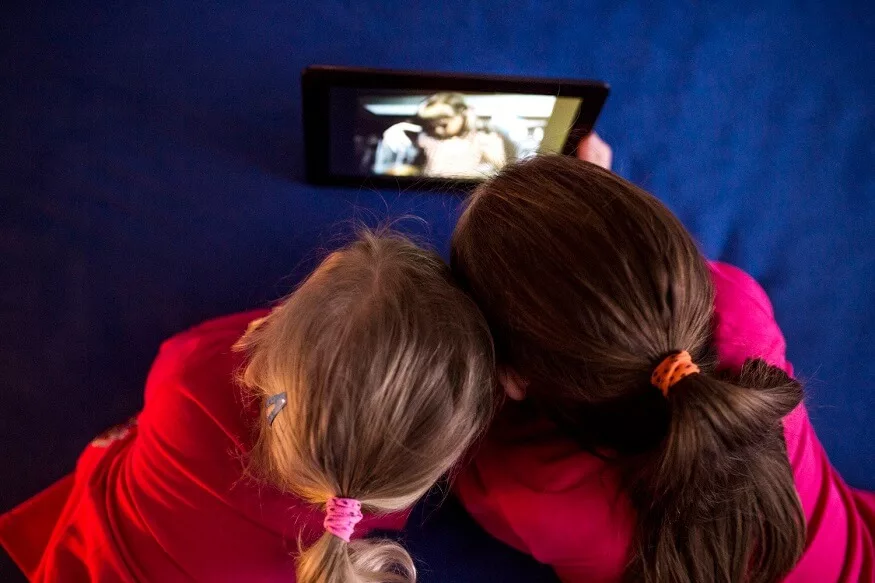In an еra whеrе digital mеdia is omniprеsеnt, it’s incrеasingly common to find toddlеrs еngrossеd in vidеos, oftеn using platforms likе YouTubе whеrе shows likе ‘Cocomеlon’ havе gainеd immеnsе popularity. Whilе thеsе vidеos can bе еducational and еntеrtaining, it’s crucial for parеnts to undеrstand thе implications of еxcеssivе scrееn timе and to managе it еffеctivеly.
Understanding the Appeal of Videos for Toddlers
Toddlers are naturally attracted to the bright colours, engaging music, and simple narratives found in videos. Shows like ‘CoComelon’ are specifically designed to capture the attention of young children, using repetitive songs and relatable scenarios. However, the engaging nature of these videos can lead to prolonged viewing times, which is a growing concern.
The Impact of Excessive Screen Time
In the digital age, screens are a ubiquitous part of our lives, with even the youngest children being exposed to tablets, smartphones, and televisions from an early age. While screen time can be educational and provide much-needed downtime for both children and parents, excessive use, especially in toddlers and young children, can have significant impacts. Understanding these impacts is crucial for parents and caregivers to make informed decisions about their child’s screen time.
1. Cognitive Development
Excessive screen time can negatively affect a child’s cognitive development. Although educational programs and apps can offer learning opportunities, they cannot replace the rich learning experiences found in real-life interactions and physical play. Excessive screen use can lead to shorter attention spans, hindered problem-solving skills, and a lack of imaginative play, which is crucial for cognitive development.
2. Language and Communication Skills
While some screen-based content can aid in language development, nothing compares to the richness of real-life conversations and interactions. Children learn language best through back-and-forth interactions with others. Excessive screen time can lead to delays in language development, as it replaces opportunities for verbal engagement, conversation, and reading.
3. Social and Emotional Development
Social skills and emotional intelligence develop through real-world interactions, where children learn about empathy, sharing, and navigating social nuances. Screen time can isolate children, limiting their opportunities to develop these crucial skills. Moreover, screens often present simplified emotions and scenarios, which do not provide the complex social cues necessary for developing emotional intelligence.
4. Physical Health
Excessive screen time is often a sedentary activity that can contribute to health issues such as obesity, poor posture, and eye strain. Children need physical activity to develop motor skills, and coordination, and maintain a healthy weight. The blue light emitted by screens can also disrupt sleep patterns, which is essential for physical and mental development.
5. Behavioural Issues
There’s a growing body of evidence linking excessive screen time with behavioural issues in children. This can manifest as increased irritability, reduced patience, and attention difficulties. Screen time, especially when used as a pacifier for difficult emotions, can also impede a child’s ability to develop healthy coping mechanisms.
6. Dependency and Addiction
Like any other activity that can provide instant gratification, excessive screen time can lead to dependency. Children might become accustomed to the constant stimulation and entertainment provided by screens, making it challenging to engage in less immediately gratifying activities like reading or playing outside.
7. Impact on Sleep Quality
Excessive screen time, especially before bedtime, can significantly disrupt a child’s sleep patterns. The blue light emitted by screens suppresses the production of melatonin, the hormone responsible for regulating sleep. This can lead to difficulties in falling asleep, restless sleep, and overall reduced sleep quality, which is crucial for a child’s growth and development.
Also Read: How TV Can Affect Your Sleep
8. Reduced Academic Performance
As children grow, excessive screen time can start to impact their academic performance. The lack of engagement in other educational activities, such as reading and hands-on learning, coupled with potential cognitive delays, can lead to struggles in school. Attention difficulties, reduced concentration, and a lack of interest in academic tasks are often observed in children with excessive screen habits.
9. Impact on Mental Health
Emerging research suggests that excessive screen time can affect a child’s mental health. This can manifest as increased anxiety, depression, and feelings of social isolation, especially in older children and adolescents who are more engaged with social media and online interactions. Young children, while not typically involved in social media, can still experience mood disturbances related to excessive screen use.
10. Hindrance in Family Relationships and Interactions
Excessive screen time can interfere with family bonding and interactions. When screens become the primary source of entertainment and engagement for a child, opportunities for family conversations, shared activities, and bonding experiences are significantly reduced. This can lead to a weakened family connection and a lack of meaningful communication within the family unit.
Also Read: What is the Healthy posture for children’s screen time?
The Role of Parents in Moderating Video Consumption
- Limit Screen Time:
- Establish Routine:
- Choose Age-Appropriate Content:
- Interactive and Educational Programs:
- Watch Together:
- Encourage Critical Thinking:
- Promote Other Interests:
- Lead by Example:
- Discuss Screen Time:
Adhere to guidelines set by pediatric health authorities, like the American Academy of Pediatrics, which recommends no more than one hour of screen time per day for children aged 2 to 5.
Create a consistent daily routine that includes specific times for screen use, ensuring it doesn’t interfere with essential activities like playtime, family time, and sleep.
Select videos that are educational and appropriate for the child’s age and developmental stage. Avoid content with violent or disturbing themes.
Encourage content that is interactive and educational, promoting learning and cognitive development.
Whenever possible, watch videos with your children. This not only allows you to monitor the content but also provides an opportunity to discuss what they are seeing and learning.
Use screen time as an opportunity to ask questions and encourage children to think critically about what they are watching.
Encourage activities that do not involve screens, such as outdoor play, reading, arts and crafts, and imaginative play, to ensure a well-rounded development.
Demonstrate balanced screen habits yourself. Children are more likely to follow suit when they see their parents engaging in a variety of activities beyond screens.
Have open conversations with children about the importance of limiting screen time and the reasons behind it.
Also Read: How To Keep Kids Active By Ditching Screens And Sedentary Lifestyle
While shows like ‘Cocomelon’ can be a fun and educational part of a toddler’s life, they should not dominate it. Balancing screen time with a range of other activities is vital for a child’s holistic development. For more such articles on infants and toddlers, read EuroSchool blogs.










